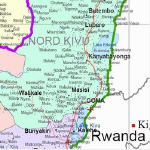The United States is re-emphasizing a reward program of up to $5 million per person to get information about 13 Rwandan genocide suspects still believed to be in the eastern part of the Democratic Republic of Congo (DRC). This comes as the U.N. peacekeeping mission says it is trying to be more forceful in pushing the Rwandan fighters out of Congo. VOA's Nico Colombant has more from our regional bureau in Dakar.
U.S. ambassador to the DRC, William Garvelink gave VOA details of the reward program.
"The 13 names are individuals who were indicted by the tribunal [for] Rwanda so these 13 people have been charged by the tribunal with war crimes or genocide," he said.
The court based in Tanzania is trying those believed to be the most responsible for the 1994 killing spree in Rwanda, mostly by ethnic-Hutu extremists.
U.S. officials have said posters, pamphlets and a 24-hour telephone hotline are being used to push the reward program, as the Tanzania court may wrap up this year.
Ambassador Garvelink says he does not believe the push interferes with U.N. and Congolese efforts to disarm, demobilize and repatriate former Rwandan fighters.
These continue to perpetrate violence, including a recent attack on a displaced people's camp in North Kivu, which the United Nations says killed four civilians.
"This program complements the other efforts," he added. "We are trying to use all our resources to either bring to justice or relocate individuals who are destabilizing the area. These folks who have been charged by the criminal court always pose a bit of a difficulty between Rwanda and the Congo."
During Congo's 1998-2003 war, Rwandan ethnic Hutu fighters fought alongside Congo's military against Rwandan-backed rebels who controlled parts of mineral rich eastern DRC.
Congo's Defense Minister Chikez Diemu says it is time they go home.
He says Congo had over 5 million dead from its war, and that it is enough.
Diemu says Congo's government is cooperating fully with international efforts, and that three fighters were recently turned over by Congolese forces to the court in Tanzania.
But a laying-down-of-weapons ceremony attended by a breakaway faction of former Interahamwe militia in the Congolese city of Kisangani last month was described as a sham by the main Democratic Forces for the Liberation of Rwanda.
The head of the U.N peacekeeping mission Alan Doss said the process had to start somewhere. During a recent visit by a U.N. Security Council delegation, he appealed for new military equipment like unmanned drones, saying his forces were under-equipped to confront the Rwandan fighters.
He said the Rwandan fighters presence is preventing peace in the Congo. Different militia groups are also active in the region, some of them still allied to the Rwandans, while ethnic-Tutsi general Laurent Nkunda leads an ongoing insurgency against those groups.
Related articles
- • DR Congo Asks Rwanda to Turn Over M23 Rebel Leaders (July 26, 2013)
- • DR Congo, Rwanda Sign Pact to Fight Rebels in Eastern Congo (July 15, 2012)
- • Kagame Is A Problem for The U.S. and The U.K. (June 23, 2012)
- • UN Report Accuses Rwanda of Supporting Bosco Ntaganda Rebels (May 28, 2012)
- • Kabila, Army Chief of Staff head to eastern Congo to deal with defectors (April 10, 2012)
- • DR Congo Government Warns Bosco Ntaganda He May Face Justice (April 6, 2012)
- • Kabila Confident He Will Win Re-Election (October 18, 2011)
- • UN Report: CNDP, Congolese Soldiers Involved in Illegal Mining Operations (November 30, 2010)
- • DR Congo says ex-rebel chief Nkunda to be extradited from Rwanda in 2010 (January 18, 2010)
- • Amnesty International: more prosecutions should follow for war crimes in the Kivus (November 19, 2009)
- • Congo rebel fight 'must continue' (November 10, 2009)
- • Human Rights Watch Chalks New Allegations Against Congo, Rwanda Troops (November 3, 2009)
- • DR Congo deports genocide suspect (September 20, 2009)
- • Human Rights: MONUC releases reports on Kiwanja and Kanyabayonga incidents (September 9, 2009)
- • 'New era' for DR Congo and Rwanda (August 6, 2009)
- • Congo ex-rebel 'working with UN' (April 29, 2009)
- • Return of Hutu Militias Sparks 100,000 New Displacements in Eastern Congo (April 27, 2009)
- • UN complains of Congo troop delay (April 8, 2009)
- • Rwanda troops withdraw from Congo (February 25, 2009)
- • Signs of Progress Reported in Congo Peace Negotiations (February 23, 2009)
- • DR Congo says foreign troops to pull back (February 22, 2009)
- • Negotiations between Kinshasa and CNDP Rebels to End Friday (February 20, 2009)
- • DR Congo, Rwanda accomplish 65% of joint military operation (February 15, 2009)
- • UN mission in DR Congo says situation calm in North Kivu province (February 8, 2009)
- • Kinshasa and Kigali Hold Talks over Extradition of Rebel Leader (February 6, 2009)
- • DR Congo says over 2,000 Rwandan refugees ready to return (February 4, 2009)
- • North Kivu operation a boost for repatriation, peace - president (February 3, 2009)
- • DRC Army Integrates Over 6,000 Rebels (January 29, 2009)
- • Amnesty International: Laurent Nkunda and Bosco Ntaganda must face justice (January 28, 2009)
- • Rebel Integration Into Congo Army Fails to Begin (January 28, 2009)







